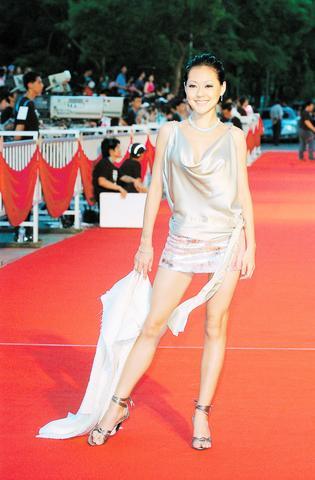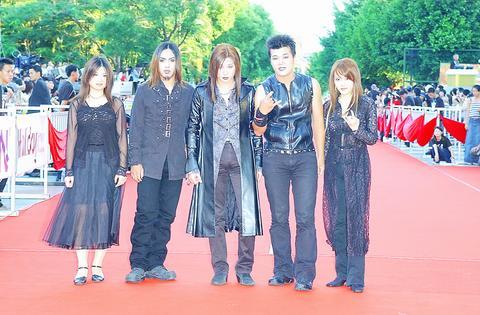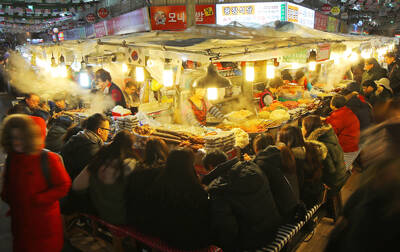Anyone who's anyone in Mando-pop was in Taipei last Saturday for the 14th Golden Melody Awards -- the music industry's annual orgy of self-congratulation that claims to recognize the best Chinese-language music released over the past year. Whatever the event's purpose, it's a convenient excuse for the whole pantheon of Chinese music celebrities to dress up to the nines and high-five each other all night.
Pop Stop showed up early for the red carpet extravaganza and, as in years past, this was probably the most exciting part of the show because of the thousands of screaming fans crushing the barricades for a view of their idols. Of course, the clothes worn by the stars is what generates most of the hoopla and this year there were good reasons to blush, drool and reach for a doggie bag.

Judging from the reactions in the post-event fashion analyses of local papers and with Pop Stop's complete concurrence, Little S (

It was also impossible not to notice that the ladies this year were showing more flesh than in recent memory.
As for the men, it seemed like they had collectively raided Pablo Escobar's wardrobe, cleaning it out of all its white double-breasted suits. Jay Chou (

But being one of only a handful of presentably dressed men at the show wasn't enough to earn Jay an award. After cleaning house last year at the Golden Melodies by taking the best songwriter, best producer and best album awards, he came up empty this year and has since been quoted in papers whining about the "unfair" judge panel.

Harsh words have also been directed at the judge panel by the three nominees of the best male Taiwanese singer award: Tsai Hsiao-hu (
The dignified losers of the night were A-mei (
The only surprise winners of the night were Goth rockers Chthonic (

In recent weeks the Trump Administration has been demanding that Taiwan transfer half of its chip manufacturing to the US. In an interview with NewsNation, US Secretary of Commerce Howard Lutnick said that the US would need 50 percent of domestic chip production to protect Taiwan. He stated, discussing Taiwan’s chip production: “My argument to them was, well, if you have 95 percent, how am I gonna get it to protect you? You’re going to put it on a plane? You’re going to put it on a boat?” The stench of the Trump Administration’s mafia-style notions of “protection” was strong

Every now and then, it’s nice to just point somewhere on a map and head out with no plan. In Taiwan, where convenience reigns, food options are plentiful and people are generally friendly and helpful, this type of trip is that much easier to pull off. One day last November, a spur-of-the-moment day hike in the hills of Chiayi County turned into a surprisingly memorable experience that impressed on me once again how fortunate we all are to call this island home. The scenery I walked through that day — a mix of forest and farms reaching up into the clouds

With one week left until election day, the drama is high in the race for the Chinese Nationalist Party (KMT) chair. The race is still potentially wide open between the three frontrunners. The most accurate poll is done by Apollo Survey & Research Co (艾普羅民調公司), which was conducted a week and a half ago with two-thirds of the respondents party members, who are the only ones eligible to vote. For details on the candidates, check the Oct. 4 edition of this column, “A look at the KMT chair candidates” on page 12. The popular frontrunner was 56-year-old Cheng Li-wun (鄭麗文)

“Eighteen years ago, people didn’t even know the name of this ingredient,” says 58-year-old Gil Sa-hyeon, holding up a cluster of dried brownish stems. “Now it’s everywhere.” His shop, Joseon Yakcho, sits in the heart of Seoul’s Yangnyeongsi Market, South Korea’s largest traditional medicinal herb market, its streets lined with shops displaying buckets of herbs such as licorice root and cinnamon bark that spill on to the pavements, filling the air with their distinct, earthy aroma. The ingredient Gil is referring to is hovenia dulcis, known in Korean as heotgae — the oriental raisin tree that’s become the cornerstone of South Korea’s